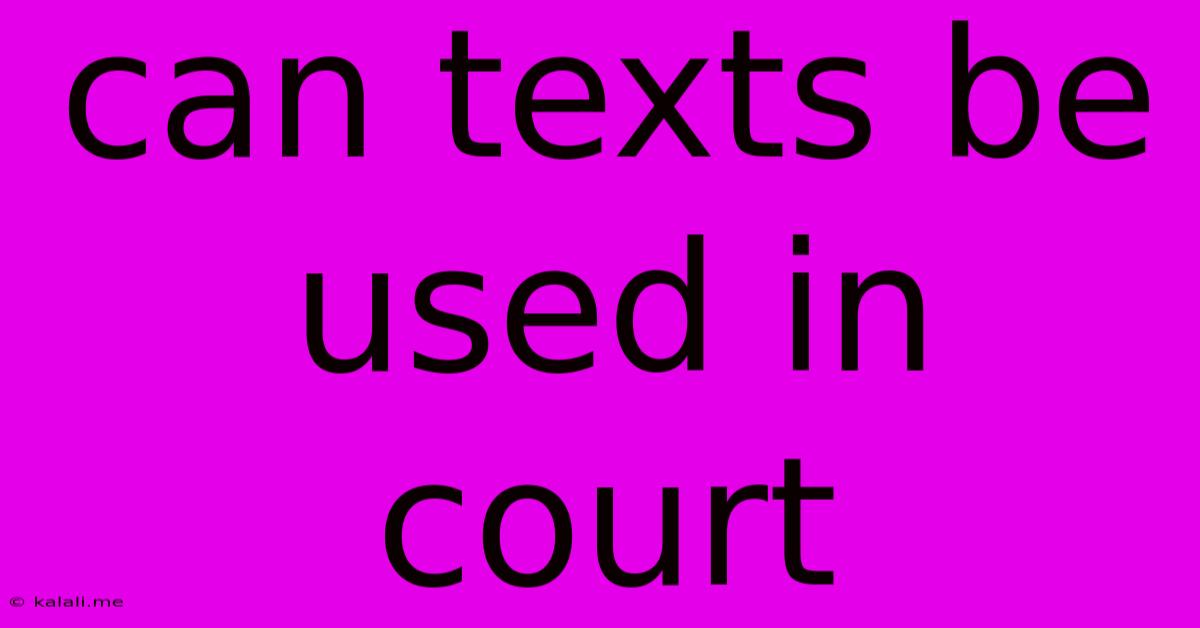Can Texts Be Used In Court
Kalali
Jun 06, 2025 · 4 min read

Table of Contents
Can Texts Be Used in Court? A Comprehensive Guide
Meta Description: Discover the admissibility of text messages as evidence in court. Learn about the legal requirements, challenges, and best practices surrounding text message evidence in legal proceedings.
Text messages, ubiquitous in modern communication, are increasingly becoming crucial pieces of evidence in legal battles. But can texts actually be used in court? The answer is nuanced and depends on several factors, making it a complex issue for both legal professionals and everyday individuals. This guide will clarify the legal landscape surrounding text message admissibility.
The Admissibility of Text Messages as Evidence
The admissibility of any evidence, including text messages, hinges on several key legal principles. Primarily, the evidence must be relevant to the case and authentic. Relevance means the text message must have a bearing on a fact in issue. Authenticity means the court must be convinced that the text message is genuine and hasn't been tampered with. This involves proving who sent and received the messages.
Beyond relevance and authenticity, the evidence must also comply with rules of evidence specific to the jurisdiction. These rules vary slightly from state to state and country to country, but generally, they focus on ensuring the evidence is not unduly prejudicial or unfairly obtained.
Proving Authenticity and Relevance
Proving the authenticity of a text message can involve several methods:
- Phone records: Telephone company records can corroborate the timing and numbers involved in the text exchange.
- Metadata: Metadata embedded within the text message itself (date, time, sender, recipient information) can establish authenticity. However, this metadata can be altered or removed, which is why other forms of corroboration are vital.
- Witness testimony: A witness who can attest to the exchange, either having seen the messages being sent or received or having been involved in the conversation, is crucial.
- Screenshots: While screenshots are often considered reliable, they are more prone to manipulation than other evidence forms. They should always be accompanied by additional supporting evidence.
- Chain of custody: Demonstrating an unbroken chain of custody, showing how the text messages were collected, stored, and handled, is paramount to proving their authenticity. This involves establishing who had access to the messages and at what point.
Demonstrating relevance requires showing how the text message directly relates to the case. This might involve proving a contract breach, harassment, defamation, or other legal claim, using the text message content to support the claim.
Challenges in Using Text Messages as Evidence
Several hurdles can hinder the admissibility of text messages:
- Hearsay: Text messages often fall under the hearsay rule, which generally prohibits the use of out-of-court statements to prove the truth of the matter asserted. However, exceptions to the hearsay rule exist, such as statements made against interest or excited utterances. A lawyer needs to carefully consider these exceptions.
- Authentication difficulties: As mentioned earlier, proving the authenticity of a text message can be challenging, especially if there is a dispute about who sent or received the message.
- Privacy concerns: Obtaining and using text messages might involve privacy issues. Proper legal procedures need to be followed to access these communications. This often requires warrants or subpoenas.
- Data recovery: Recovering deleted texts requires specialized expertise and might not always be successful. The longer the time elapsed since deletion, the less likely successful recovery becomes.
Best Practices for Using Texts as Evidence
For both legal professionals and individuals who may anticipate their texts being used as evidence, best practices include:
- Keep records: Maintain backups of important text message conversations.
- Be mindful of your language: Avoid using inflammatory language or making statements you wouldn't want repeated in a court of law.
- Use secure messaging platforms: While not foolproof, more secure messaging platforms may offer greater protection against tampering or unauthorized access.
- Consult with a legal professional: If you anticipate a legal dispute, consult a lawyer to understand the admissibility rules and best practices for preserving text message evidence.
In conclusion, while text messages can certainly be used as evidence in court, their admissibility hinges on establishing their authenticity and relevance, and overcoming potential challenges related to hearsay and privacy. Careful preservation and legal counsel are crucial for anyone involved in a case where text messages may play a role.
Latest Posts
Latest Posts
-
Grit For Sanding Between Seal Coats
Jun 07, 2025
-
How To Make A Db With Non Static Sql Data
Jun 07, 2025
-
How Old Is Rarity From My Little Pony
Jun 07, 2025
-
And So They Were Both Subs
Jun 07, 2025
-
Does Seath Have To Kill You
Jun 07, 2025
Related Post
Thank you for visiting our website which covers about Can Texts Be Used In Court . We hope the information provided has been useful to you. Feel free to contact us if you have any questions or need further assistance. See you next time and don't miss to bookmark.